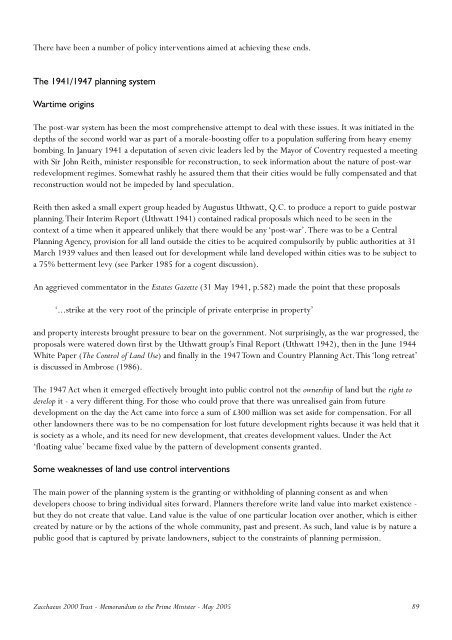Memorandum-to-the-Prime-Minister-on-Unaffordable-Housing
Memorandum-to-the-Prime-Minister-on-Unaffordable-Housing
Memorandum-to-the-Prime-Minister-on-Unaffordable-Housing
Create successful ePaper yourself
Turn your PDF publications into a flip-book with our unique Google optimized e-Paper software.
There have been a number of policy interventi<strong>on</strong>s aimed at achieving <str<strong>on</strong>g>the</str<strong>on</strong>g>se ends.<br />
The 1941/1947 planning system<br />
Wartime origins<br />
The post-war system has been <str<strong>on</strong>g>the</str<strong>on</strong>g> most comprehensive attempt <str<strong>on</strong>g>to</str<strong>on</strong>g> deal with <str<strong>on</strong>g>the</str<strong>on</strong>g>se issues. It was initiated in <str<strong>on</strong>g>the</str<strong>on</strong>g><br />
depths of <str<strong>on</strong>g>the</str<strong>on</strong>g> sec<strong>on</strong>d world war as part of a morale-boosting offer <str<strong>on</strong>g>to</str<strong>on</strong>g> a populati<strong>on</strong> suffering from heavy enemy<br />
bombing. In January 1941 a deputati<strong>on</strong> of seven civic leaders led by <str<strong>on</strong>g>the</str<strong>on</strong>g> Mayor of Coventry requested a meeting<br />
with Sir John Reith, minister resp<strong>on</strong>sible for rec<strong>on</strong>structi<strong>on</strong>, <str<strong>on</strong>g>to</str<strong>on</strong>g> seek informati<strong>on</strong> about <str<strong>on</strong>g>the</str<strong>on</strong>g> nature of post-war<br />
redevelopment regimes. Somewhat rashly he assured <str<strong>on</strong>g>the</str<strong>on</strong>g>m that <str<strong>on</strong>g>the</str<strong>on</strong>g>ir cities would be fully compensated and that<br />
rec<strong>on</strong>structi<strong>on</strong> would not be impeded by land speculati<strong>on</strong>.<br />
Reith <str<strong>on</strong>g>the</str<strong>on</strong>g>n asked a small expert group headed by Augustus Uthwatt, Q.C. <str<strong>on</strong>g>to</str<strong>on</strong>g> produce a report <str<strong>on</strong>g>to</str<strong>on</strong>g> guide postwar<br />
planning.Their Interim Report (Uthwatt 1941) c<strong>on</strong>tained radical proposals which need <str<strong>on</strong>g>to</str<strong>on</strong>g> be seen in <str<strong>on</strong>g>the</str<strong>on</strong>g><br />
c<strong>on</strong>text of a time when it appeared unlikely that <str<strong>on</strong>g>the</str<strong>on</strong>g>re would be any ‘post-war’.There was <str<strong>on</strong>g>to</str<strong>on</strong>g> be a Central<br />
Planning Agency, provisi<strong>on</strong> for all land outside <str<strong>on</strong>g>the</str<strong>on</strong>g> cities <str<strong>on</strong>g>to</str<strong>on</strong>g> be acquired compulsorily by public authorities at 31<br />
March 1939 values and <str<strong>on</strong>g>the</str<strong>on</strong>g>n leased out for development while land developed within cities was <str<strong>on</strong>g>to</str<strong>on</strong>g> be subject <str<strong>on</strong>g>to</str<strong>on</strong>g><br />
a 75% betterment levy (see Parker 1985 for a cogent discussi<strong>on</strong>).<br />
An aggrieved commenta<str<strong>on</strong>g>to</str<strong>on</strong>g>r in <str<strong>on</strong>g>the</str<strong>on</strong>g> Estates Gazette (31 May 1941, p.582) made <str<strong>on</strong>g>the</str<strong>on</strong>g> point that <str<strong>on</strong>g>the</str<strong>on</strong>g>se proposals<br />
‘...strike at <str<strong>on</strong>g>the</str<strong>on</strong>g> very root of <str<strong>on</strong>g>the</str<strong>on</strong>g> principle of private enterprise in property’<br />
and property interests brought pressure <str<strong>on</strong>g>to</str<strong>on</strong>g> bear <strong>on</strong> <str<strong>on</strong>g>the</str<strong>on</strong>g> government. Not surprisingly, as <str<strong>on</strong>g>the</str<strong>on</strong>g> war progressed, <str<strong>on</strong>g>the</str<strong>on</strong>g><br />
proposals were watered down first by <str<strong>on</strong>g>the</str<strong>on</strong>g> Uthwatt group’s Final Report (Uthwatt 1942), <str<strong>on</strong>g>the</str<strong>on</strong>g>n in <str<strong>on</strong>g>the</str<strong>on</strong>g> June 1944<br />
White Paper (The C<strong>on</strong>trol of Land Use) and finally in <str<strong>on</strong>g>the</str<strong>on</strong>g> 1947 Town and Country Planning Act.This ‘l<strong>on</strong>g retreat’<br />
is discussed in Ambrose (1986).<br />
The 1947 Act when it emerged effectively brought in<str<strong>on</strong>g>to</str<strong>on</strong>g> public c<strong>on</strong>trol not <str<strong>on</strong>g>the</str<strong>on</strong>g> ownership of land but <str<strong>on</strong>g>the</str<strong>on</strong>g> right <str<strong>on</strong>g>to</str<strong>on</strong>g><br />
develop it - a very different thing. For those who could prove that <str<strong>on</strong>g>the</str<strong>on</strong>g>re was unrealised gain from future<br />
development <strong>on</strong> <str<strong>on</strong>g>the</str<strong>on</strong>g> day <str<strong>on</strong>g>the</str<strong>on</strong>g> Act came in<str<strong>on</strong>g>to</str<strong>on</strong>g> force a sum of £300 milli<strong>on</strong> was set aside for compensati<strong>on</strong>. For all<br />
o<str<strong>on</strong>g>the</str<strong>on</strong>g>r landowners <str<strong>on</strong>g>the</str<strong>on</strong>g>re was <str<strong>on</strong>g>to</str<strong>on</strong>g> be no compensati<strong>on</strong> for lost future development rights because it was held that it<br />
is society as a whole, and its need for new development, that creates development values. Under <str<strong>on</strong>g>the</str<strong>on</strong>g> Act<br />
‘floating value’ became fixed value by <str<strong>on</strong>g>the</str<strong>on</strong>g> pattern of development c<strong>on</strong>sents granted.<br />
Some weaknesses of land use c<strong>on</strong>trol interventi<strong>on</strong>s<br />
The main power of <str<strong>on</strong>g>the</str<strong>on</strong>g> planning system is <str<strong>on</strong>g>the</str<strong>on</strong>g> granting or withholding of planning c<strong>on</strong>sent as and when<br />
developers choose <str<strong>on</strong>g>to</str<strong>on</strong>g> bring individual sites forward. Planners <str<strong>on</strong>g>the</str<strong>on</strong>g>refore write land value in<str<strong>on</strong>g>to</str<strong>on</strong>g> market existence -<br />
but <str<strong>on</strong>g>the</str<strong>on</strong>g>y do not create that value. Land value is <str<strong>on</strong>g>the</str<strong>on</strong>g> value of <strong>on</strong>e particular locati<strong>on</strong> over ano<str<strong>on</strong>g>the</str<strong>on</strong>g>r, which is ei<str<strong>on</strong>g>the</str<strong>on</strong>g>r<br />
created by nature or by <str<strong>on</strong>g>the</str<strong>on</strong>g> acti<strong>on</strong>s of <str<strong>on</strong>g>the</str<strong>on</strong>g> whole community, past and present. As such, land value is by nature a<br />
public good that is captured by private landowners, subject <str<strong>on</strong>g>to</str<strong>on</strong>g> <str<strong>on</strong>g>the</str<strong>on</strong>g> c<strong>on</strong>straints of planning permissi<strong>on</strong>.<br />
Zacchaeus 2000 Trust - <str<strong>on</strong>g>Memorandum</str<strong>on</strong>g> <str<strong>on</strong>g>to</str<strong>on</strong>g> <str<strong>on</strong>g>the</str<strong>on</strong>g> <str<strong>on</strong>g>Prime</str<strong>on</strong>g> <str<strong>on</strong>g>Minister</str<strong>on</strong>g> - May 2005 89




